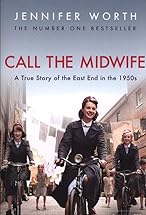I am in tears after having
spent the first week of my summer engrossed in three seasons of the BBC drama, Call the Midwife. Truly, I have never
seen a television serial more heart-felt and touching than this story of a
group of young English midwives and Catholic nuns living together in the
poorest parts of London. The setting is the late 50s, where hair styles and
fashion still harken to the dowdy post-WWII days. That, and their meager living
quarters are the antithesis to the typical BBC drama we Americans are used to
viewing, except in a Dickens tale. Normally, we like seeing castles and the grand,
stately homes of the aristocracy, such as the Granthams of Downton Abby. But the Granthams aren’t half as interesting as these
sweet, giving ladies whose calling is to help bring new life into the world. I
feel like I’ve just said good-bye to life-long friends who I may never see
again. Season four airs in spring, 2015, and that seems to be eons from now.
Based on the memoirs of Jennifer
Worth, Call the Midwife is based on a
slice of history that is foreign to the typical American. Many of us have heard
of women giving birth through the services of a midwife, but in the US, it is a
bit unusual and odd. Not so in the UK. The practice became accepted during WWII
when British doctors were scarce and women had to rise to the occasion and
perform duties typically relegated to men. During my five years in London in
the late 90s, I knew several women who gave birth through midwives.
Confession: the first episode
turned me off, and I promptly “tuned out” about halfway through. Watching poor
English women endure excruciating pain without the comforts of modern medicine
AND in extreme unsanitary conditions did not make for a relaxed time of
entertainment in my mind. So I put this series aside for about a year, ignoring
my mother’s pleas to give it another chance. Eventually, having exhausted all
the other BBC serials on Netflix, I did just that, forcing myself through the
first episode. Fortunately, by the end of episode two, I was hooked.
What is the appeal? As always
with a good serial, it is the characters. Each episode is introduced and closed
with the haunting voiceover of Jenny Lee (Vanessa Redgrave), who recounts her
memories as a midwife during post-Korean War days. Naïve and idealistic, Jenny (played
by up-and-coming A-lister, Jessica Raine) begins her story arriving at an old,
crumbling building in London’s East End. Cold and unassuming, Nonnatus House is
actually a warm, loving environment, run by four unique, yet quirky nuns. One
of my favorites is Sister Julienne (played by Jenny Agutter), who is thin and
beautiful and wears a perpetual smile while espousing wisdom and knowledge at
every turn. In contrast, my other favorite, Sister Evangeline (played by Pam
Ferris), is thick and burly and normally bears a sour countenance. But
underneath her bossy attitude is a heart of gold and plenty of her own form of
street-smarts advice to carry the day. I wasn’t as much of a fan of Sister
Monica Joan (played by Judy Parfitt) and Sister Bernadette, but they do add a
bit of flavor to the ensemble.
The true strength of the show
is in the diverse personalities of the four young midwives living under the
authority of Sisters Julienne and Evangeline. First, there is our heroine,
Jenny, who is gorgeous, smart, and self-sufficient; Trixie (Helen George), who
is sexy and sassy with a full head of blonde curls and plenty of brains to go
with it; and Cynthia (Bryony Hannah), who is plain, sweet, and unassuming. I absolutely
adored those three characters, but the one that stole my heart is Chummy,
played by the famous UK comedienne, Miranda Hart.
Standing over six feet tall,
with glasses, slouched shoulders, and a botched short hair-do, Chummy (real
name Camilla) is the most unlikely character on a television serial with whom anyone
could imagine falling head-over-heels in love (even my hubby adores her!). Born
from aristocracy, Chummy hasn’t a lick of poise or physical attractiveness in
keeping with her station in life. Think lumbering ugly duckling, awkward nerd,
and drag queen lookalike all rolled into one. Yet, she is charming, adorable,
full of wit and encouragement, and likes herself enough to romance the local
constable (Ben Caplan). Her character is a huge reason the show has been so
successful (drawing 10 million viewers per episode). Personally, I think it is
because Chummy represents the beauty of a woman emanating from the inside out
and not solely from the external as the world demands.
For those of you who need
your British love interests, there are plenty of handsome suitors to satisfy.
And you’ll certainly see more than your fair share of sweet babies being born,
AND be very thankful for the blessing of epidurals that are common today. In
addition, the drama is top-notch, including a sprinkling of mystery, edge-of-your-seat
suspense, laughs, and spiritual reverence toward God and Jesus (very rare
today). But mostly this show oozes a sweetness that isn’t contrived or false—it
reveals the power of the love of a group of very different women who become soul
sisters by living out a life that is unusual and sacrificial.


No comments:
Post a Comment